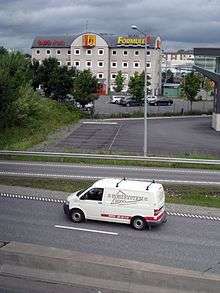Motels
A motel, short for motor hotel, is self-contained travel accommodation adapted for people who are travelling by car.

Motels are typically at 1 or 2-star level with few shared amenities. Guest rooms typically have designated parking spaces; lobby and community areas are absent, or very basic. If there's a pool, it will be outdoors and (depending on the climate) usable only seasonally. A minority have an on-site restaurant; there is no room service. As the original architecture had rooms opening directly onto a car park, rooms are self-contained with a private WC, wash handbasin and shower/bath "en suite".
North America
A motel building boom accompanied the expansion of highways in the United States and Canada during the mid-20th century. As an icon of motoring culture, the motels of the 1950s and 1960s represented a lower-cost alternative to the grand old hotels of the railway era. Most were independently owned and were low-end when they were constructed. As the original owners retire, some have withstood the test of time better than others.
Increasing land cost and the growth of cost-competitive economy, limited service hotel chains which began in the late 1970s and early 1980s have halted new motel construction, but many existing properties remain in operation. While a well-operated and properly-maintained motel in a good location may still represent good value for money, a motel in a bad neighbourhood will attract crime, adultery or other illicit activity as the ability to enter the rooms directly from the car park confers privacy.
Rarely, motels have been restored as part of a larger effort to market a destination for nostalgia tourism; U.S. Route 66 is the most common example, although a few historic motels have been saved from demolition and redevelopment in Wildwood (New Jersey)'s beach district.
North American motels usually are designed with one or two floors and a hallway on the outside of the building. By contrast, the economy, limited service hotels which have supplanted motels at the low end of the market might be very tall structures with interior hallways.
Germany and Austria
In Germany, "motel" (also referred to as Rasthaus, Raststätte oder Autohof) has come to signify any low-end property built to 'one-star' service levels; these would be classed as economy, limited service (ELS) hotels elsewhere. In Austria, the term (and its German equivalents) is a category recognized officially.
In these budget motels, the rooms are typically very basic and small with a small desk, a television (with cable and international channels dependent on location), a double bed (or a double bed with a single bunk above), and a sink. There is no toilet or shower in the room; facilities are provided by single-person showers and toilets accessible from the common hallways which are automatically self-cleaned after every use.
Oceania
Most motels in Australia, the Cook Islands, Fiji and New Zealand include a kitchenette equipped with cooking utensils, crockery and cutlery together with a table and at least two chairs, a microwave, cooking rings, toaster and fridge.
In North America these type of motel rooms which offer opportunities for self-catering are called "efficiencies".
Lusophone and hispanic countries
In Central America and South America, a "Motel" (in Mexico, Motel de paso) is often associated with extramarital encounters and rented typically for a short time (15 min to 12 hr depending on the participants' stamina). In Ecuador and Brazil, for example, any lodging with the title "Motel" is probably specialising in extramarital encounters.
As the close association of 'motel' with a "no-tell motel" for adultery follows linguistic, not geographic, boundaries the same associations will appear in the Spanish, Portuguese and Italian languages in western Europe.
